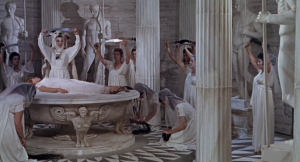Arelli Fusci Patris
nihil aliud intercidet quam corpus fragilitatis caducae; morbis obnoxium, casibus expositum, proscriptionibus obiectum
nihil: indeclinable neuter noun, either nominative subject or accusative object of verb. See “intercidet” below.
aliud: singular neuter adjective modifying “nihil”; either nominative subject or accusative object of verb. See “intercidet” below.
intercidet: 3rd person, singular, future, active, indicative verb. Either transitive or intransitive.
- if transitive, intercidet=subject+verb, nihil =object; i.e.: “he will kill nothing” or “he will cut nothing to pieces”
- if intransitive, nihil =subject, intercidet=verb; i.e.: “nothing will die”
quam: adverb, indeclinable. Used to indicate comparison; i.e.: “than”
- when “quam” is used, the two things compared are put into the same case (A&G 407)
- “alius” is sometimes followed by “quam” in formal prose (A&G 407d); i.e.: “nothing other than the body…”
corpus: singular neuter noun, matching “nihil” and “aliud” in case; either nominative or accusative, depending on whether “intercidet” is transitive or intransitive.
morbis obnoxium, casibus expositum, proscriptionibus obiectum: series of appositives. “obnoxium”, “expositum”, and “obiectum” all modify “corpus”, matching it in case, gender and number.
nec potes non videri nimis vixisse qui moreris rei publicae superstes
potes: 2nd person, singular, present, active, indicative verb; main verb of the sentence.
– potes=subject+verb; i.e.: “you are able”
videri: passive present infinitive verb. “videri” in the passive can be understood as “to seem” rather than “to be seen”
qui moreris: relative clause
- qui: nominative singular masculine relative pronoun, matching subject “you” contained in “potes”
- moreris: 2nd person, singular, present, active, indicative. Appears passive because it is a deponent verb.
superstes: can be either: 2nd person, singular, present, active, subjunctive verb, “you shall stand over”; or nominative, masculine, singular, 3rd declension noun, “survivor” or “support”
- if “superstes” is a subjunctive verb, rei publicae take dative indirect object with the compound verb “supersto” (A&G 370); i.e.: “you shall stand over the republic”
- in this case, “rei publicae superstes” becomes a main clause separate from the rest of the sentence, with “superstes” acting as a main use subjunctive
- if “superstes” is a 3rd declension noun, rei publicae goes with nominative noun “supetstes”; i.e.: “a survivor of the state” or “a support for/of the state”
- in this case, “rei publicae superstes” becomes a noun phrase, acting as an appositive that modifies the implied subject “you” in the main verb “potes”
note: the definition we take for “superstes” affects our understanding of its case use:
- if we take superstes to mean “survivor”, then it may be considered an objective genitive. I.e.: “a survivor of the republic”, as in: “you (Cicero) survive the republic”. Here, “survive” functions in the sense “to out live (or stand over)”, suggesting that even though Cicero himself may die, his legacy will survive or outlive the republic. Although now we tend not to use “survive” in this sense in everyday speech, you can still find it in this form in obituaries, such as: “Jane Doe is survived by her children”
- if we take superstes to mean “supporter”, then it may be considered a dative of reference. I.e.: “a supporter for/of the republic”.
